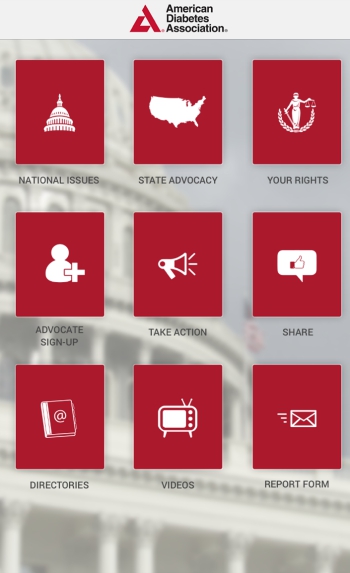New and Noteworthy
Supreme Court Decisions Help People with Diabetes
 In the last issue of Diabetes Docket, we told you about two important cases pending at the U.S. Supreme Court. In King v. Burwell, the Court found that the tax subsidies available under the Affordable Care Act that help people afford health insurance are legal. This is very good news for people with diabetes, many of whom need federal tax credits in order to afford health care. In response to the Court’s ruling, the Association, along with the American Cancer Society Cancer Action Network, the American Heart Association, and the National Multiple Sclerosis Society, published an op-ed noting the important scientific benefits of affordable, accessible health care. In the last issue of Diabetes Docket, we told you about two important cases pending at the U.S. Supreme Court. In King v. Burwell, the Court found that the tax subsidies available under the Affordable Care Act that help people afford health insurance are legal. This is very good news for people with diabetes, many of whom need federal tax credits in order to afford health care. In response to the Court’s ruling, the Association, along with the American Cancer Society Cancer Action Network, the American Heart Association, and the National Multiple Sclerosis Society, published an op-ed noting the important scientific benefits of affordable, accessible health care.
In Sheehan v. City and County of San Francisco, the Court decided not to answer the question of how the Americans with Disabilities Act applies to interactions people with disabilities have with police. By dismissing this issue, the Court avoided narrowing the law in a way that could have negatively impacted people with diabetes.
Parents Corner
Back to School with New Laws in Arkansas and Hawaii
 As kids head back to school, students with diabetes in Arkansas and Hawaii will return armed with new laws protecting their rights to manage diabetes at school. In Arkansas, school staff can volunteer to be trained to administer insulin to students with diabetes, and these students will be allowed to manage their own diabetes if they are capable. A prior law already allows school staff to administer glucagon in an emergency. Read more about the legislative experience in Arkansas in Diabetes Forecast.
As kids head back to school, students with diabetes in Arkansas and Hawaii will return armed with new laws protecting their rights to manage diabetes at school. In Arkansas, school staff can volunteer to be trained to administer insulin to students with diabetes, and these students will be allowed to manage their own diabetes if they are capable. A prior law already allows school staff to administer glucagon in an emergency. Read more about the legislative experience in Arkansas in Diabetes Forecast.
In Hawaii, school staff can also volunteer to be trained to provide diabetes care, including administering insulin. Existing law already allows staff to administer glucagon. In addition, capable students are allowed to self-manage their diabetes and to carry diabetes supplies at school. When Governor Ige signed the Hawaii bill into law this summer, Hawaii became the 30th state to have laws addressing comprehensive diabetes management needs at school (insulin, glucagon, and student self-management).
Have questions about managing diabetes at school? We can help.
Worried about who will take care of your child’s diabetes when they return to school? Are you unsure how to navigate the school diabetes management process? We can help you.
Check out our recent free Back-to-School webinar, chock full of information about the legal rights of students with diabetes and our Safe at School campaign. And be sure to catch up with us on Twitter, where we recently chatted about the steps families can take to ensure a smooth and successful school year. As always, you can speak with a Legal Advocate for more help by calling 1-800-DIABETES (342-2383) or emailing AskADA@diabetes.org.
Diabetes on the Job
Department of Transportation Proposes New Diabetes Rule
 If you have diabetes and work as a commercial driver, you know that the process of getting – and keeping – a commercial driver’s license can be difficult when insulin is involved. This is because the medical rules for these drivers, written more than 40 years ago, disqualify a person who uses insulin. For the past decade there has been a way around this by applying for a diabetes exemption from the federal government. But that remains a long, cumbersome, and frustrating process. Many people can’t afford to wait the months it takes to get back on the road. If you have diabetes and work as a commercial driver, you know that the process of getting – and keeping – a commercial driver’s license can be difficult when insulin is involved. This is because the medical rules for these drivers, written more than 40 years ago, disqualify a person who uses insulin. For the past decade there has been a way around this by applying for a diabetes exemption from the federal government. But that remains a long, cumbersome, and frustrating process. Many people can’t afford to wait the months it takes to get back on the road.
All this may soon change. This spring, the Department of Transportation proposed a new diabetes rule that would allow people who use insulin to keep driving commercial vehicles if their treating clinician and a medical examiner say their diabetes will not interfere with safety. This is very good news for people with diabetes, who have long had to choose between managing their health and maintaining their livelihood when insulin use became necessary.
ADA has been fighting for fairness for commercial drivers for many years. Read what we told the Department of Transportation about why this new rule is so important and stay tuned for more news on this issue!
How to Get Help

Four-year-old Marissa, of Philadelphia, was happily attending a Head Start preschool program. It was a place where she could learn, have fun, and play with other children, but everything changed after she was diagnosed with type 1 diabetes. Because of her diagnosis, the school district said she could not come back to the program. Months went by as the family tried to work things out with the school, but Marissa was not able to attend. Then a friend suggested calling the American Diabetes Association. Read how the Association’s Legal Advocacy program helped get Marissa back to school.
If you, or someone you know, are treated unfairly because of diabetes, contact the American Diabetes Association at 1-800-DIABETES (342-2383) or askADA@diabetes.org.
Spread the Word
Help families learn about the rights of their children who have diabetes! Share this graphic on Facebook, Twitter, Instagram and your other networks.

Diabetes Advocacy
 Cynthia chairs her local Association Advocacy Committee and trains others about Safe at School. Guadalupe advocates for underserved communities and serves on the Association’s National Capital Area Community Leadership Board. Jane fought for years for Safe at School legislation and has a 25-year-history directing a Hawaii diabetes camp. John rode a bicycle from Georgia to Oklahoma to raise awareness and advocates on behalf of American Indians and Alaska Natives. Maudene chairs the Association’s African American Diabetes Action Council and has knocked on Congress’s door many times. Stovy formed one of the top 2014 Step Out (Walk to Stop Diabetes) fund raising teams and advocates for prevention efforts on Capitol Hill. Kathy fights for the rights of workers and others with diabetes as chair of the Association’s Legal Advocacy Subcommittee. Al helps educate legislators about the critical need for funding for diabetes research and serves on the National Board of Directors.
Cynthia chairs her local Association Advocacy Committee and trains others about Safe at School. Guadalupe advocates for underserved communities and serves on the Association’s National Capital Area Community Leadership Board. Jane fought for years for Safe at School legislation and has a 25-year-history directing a Hawaii diabetes camp. John rode a bicycle from Georgia to Oklahoma to raise awareness and advocates on behalf of American Indians and Alaska Natives. Maudene chairs the Association’s African American Diabetes Action Council and has knocked on Congress’s door many times. Stovy formed one of the top 2014 Step Out (Walk to Stop Diabetes) fund raising teams and advocates for prevention efforts on Capitol Hill. Kathy fights for the rights of workers and others with diabetes as chair of the Association’s Legal Advocacy Subcommittee. Al helps educate legislators about the critical need for funding for diabetes research and serves on the National Board of Directors.
Join these advocates and help make a difference for everyone who has diabetes. Become a Diabetes Advocate today!
Free Advocacy App!

Want to help Stop Diabetes through advocacy? We have an app for that! Become a leader in the fight to Stop Diabetes. Using our free new mobile app, you’ll be able to easily recruit new advocates on-the-go and urge local, state, and federal elected officials to make diabetes a priority.
Check it out by searching “ADA Advocacy” in the Apple App or Google Play store.
Legal Advocacy services help improve people’s lives at work, school and in other parts of life. Help support our ability to continue this work.
Miss a previous issue of Diabetes Docket? Find past issues here.
The American Diabetes Association's Legal Advocacy activities are supported by a grant from Novo Nordisk.
|
